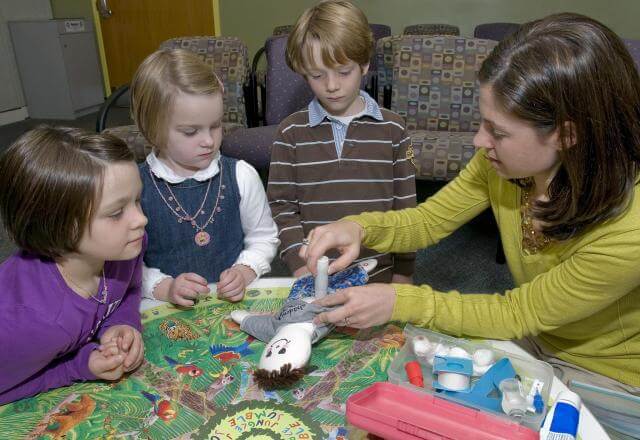Our Support for Patients and Siblings

For Siblings
The Child Life department at Johns Hopkins Children’s Center recognizes that siblings can often be affected by their brother or sister’s health care experiences. Child Life Specialists serve as a resource for helping caregivers understand and support their children at home.
Difficulties for Siblings:
- Separation from caregivers and sibling
- Change in familiar routines
- Feelings of guilt related to thoughts about their ill sibling
- Fears or misconceptions regarding hospitalization
- Decrease in attention from caregivers
Behaviors to Expect from Your Child:
- Eat or talk less
- Show withdrawn behavior
- Act out in a way to get more attention
- Give outburst of stored up feelings
- Return to behaviors of an earlier age
Child Life Specialists Can Help Your Child:
- Process events
- Prepare for a visit to the hospital
- Stay connected with hospitalized sibling
- Cope with feelings
For Patients Coping with Health Care Experiences
The Child Life department at Johns Hopkins Children’s Center places a major emphasis on the importance of helping patients and families cope with health care. Caregivers play an important role in planning and practicing useful coping strategies.
Child Life Specialists Work with Families to:
- Identify the parts of hospitalization or procedures that might be most difficult
- Create and practice a plan to cope with difficult experiences
Benefits of Coping:
- Gain a sense of control over the experience
- Partner with the medical team during procedures
- Increase self-esteem
Coping Techniques
Here are some ways to help your child manage difficult experiences associated with hospitalization:
- Counting
- Books, multimedia, CDs, games
- Deep breathing, imagery
- Positive self-statements
- Blowing (pinwheel, party blowers)
- Bubbles
- Magic wands
- Picture books
- Pop-up books
- Music
- Nature sounds
- Rhythm
- Singing, humming
- Warm or cool pack (see your nurse)
- Massage (hand, foot, forehead)
- Holding, rubbing soft item (comfort item from home like a blanket or stuffed animal)
- Praying
- Singing religious songs, chanting
- Reading sacred texts

